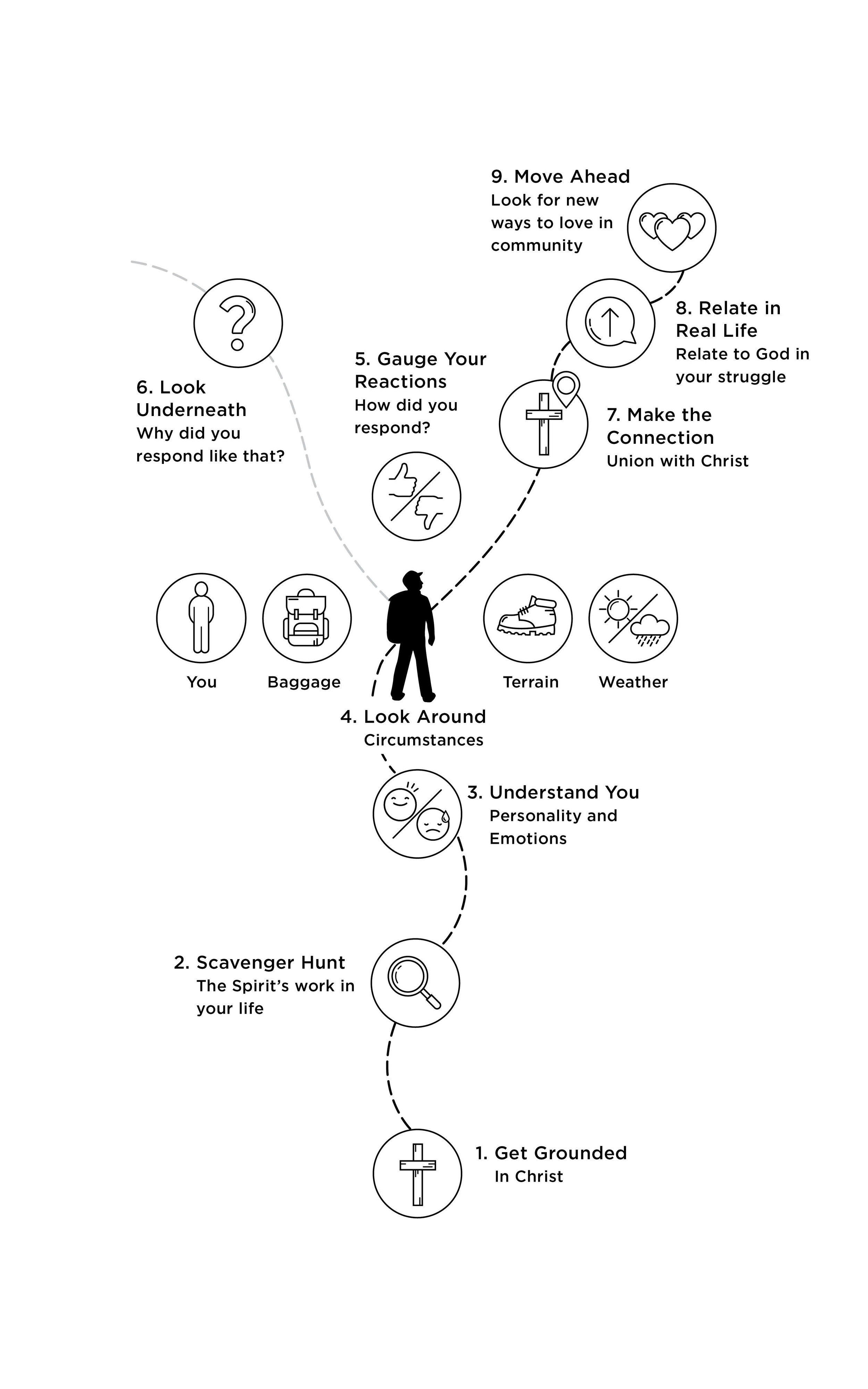Let me refresh your memory so that you know where we are in this series on change. Here are the steps that have been posted so far:
- Look to Christ
- Look for Evidence of the Spirit’s Work in Your Life
- Rightly Pay Attention to Your Circumstances
- Identify Unproductive Coping Strategies and Ungodly Responses
- Ask the “Why?” and “What?” Questions
- Remember Change is All About Relationship
- Experience Internal Transformation
Step eight focuses on how internal transformation produces noticeable fruit in your life that is the exact opposite of sinful and unproductive behaviors. But before we go there, we have to return to where I left off!
In the last blog, I used an illustration of how internal change happens as you relate to God at a very personal and practical level. “God, I am struggling with this again and I need your grace, power and wisdom to respond differently.” That is the practical cry of faith and repentance that begins the change process, which evidences itself in new and different responses to the pressures of life. It is a critical pivot that is intensely relational. It is more than a technique or a mind trick. It is relating to God based upon what Father, Son and Spirit have done and are doing in our behalf to bring about real change.
Last Blog
Here is the end of the story I was recounting in the last blog. It is a true story of me stomping up the stairs to confront my daughter in anger but slowly experiencing internal change in light of God’s grace:
As I was relating to God on the basis of I Corinthians 1:30, something began to happen. The allure of earthly peace, comfort and respect began to lose its attractiveness and charm. Instead, Jesus in all of his grace and power began to loom larger on the horizon of my gaze. New things began to fill my heart and I found myself worshiping and thanking God for his kindness to me. The irritation and anger began to dissipate. It was being replaced with joy, gratitude, patience, empathy and love. You might argue that I was experiencing deep renewal at the heart level as I engaged in deep repentance (turning away from peace, comfort and respect) and faith (turning to Christ and his loving-kindness).
As I turned the corner, I found myself walking calmly up the second flight of stairs! The grace of Jesus was changing my behavior at the level of how I used my legs and feet to walk up a flight of stairs! Another miraculous thing happened as I approached my daughter’s door. Rather than using my fist to firmly hit the door in anger, I was able to pivot my hand and simply tap on the door with my knuckles.
This simple illustration from my own life represents the micro-moments of change. It is in these seemingly simple moments of life where change, growth in grace, and our relationship with Father, Son and Spirit must become real. If we can’t relate to God in the more mundane moments of life, we will not relate to him when the more significant moments arise.
The process of internal change is a mystery at one level and something that we clearly participate in at another. In my next blog, I will tell you what transpired right after I tapped on my daughter’s door…...
So What Happened Next?
Step Eight: Move Out in New Obedience and Service
Immediately after tapping on my daughter’s door I was able to say in a calm voice, “How are you doing and would you like to talk?” An amazing change had transpired in me. My body language, tone of voice, choice of words and how I knocked on the door had been radically altered. The drama of redemption had played out in my life and my daughter had no idea that she was being rescued from me because I was being rescued from myself…by God’s gracious help!
There are so many other options that could have played out that day. I could have easily remained offended and angry, even using Bible verses to justify my unrighteous anger. It could have sounded like this,
- Angry comment #1: “Children should obey their parents in the Lord! That’s what Ephesians 6:1 says. Open this door right now!”
- Angry comment #2: “Have you forgotten the 5th commandment that says you are to honor your parents? If you don’t open this door right now, there will be serious consequences!”
- Angry comment #3: “How dare you slam doors and stomp up stairs in this house. I work hard to provide a roof over your head and a comfortable place to live. You need to think about that the next time you come in this house upset at me!”
- Angry comment #4: “Don’t you ever enter this house again and dismiss my kind gestures and greetings. That is completely inappropriate and will not be tolerated going forward! Do you hear me!”
Have you ever found yourself thinking and saying things like this? You can tell that I have! These are manipulative, ungodly statements. Only the grace and kindness of God can melt a proud parent’s heart and utterly change their speech. Thankfully, that is what happened on this occasion and continues to happen on many occasions.
A New Situation!
As soon as those calm words came out of my mouth my daughter responded in a way that might surprise and frustrate you. She said, “Go away! I don’t want to talk to anyone, not even you!”
Wow! Now I was faced with a new situation. How would I respond to her response? Would I become self-righteous on the heels of my transformation? “How can she act that way towards me, especially after I was so godly!” It almost sounds funny, doesn’t it? Thankfully, I was able to respond in a quiet manner with these words: “That’s fine, if you want to talk, I’ll be downstairs. Dinner will be ready in about an hour.”
I then proceeded to calmly and quietly walk down the stairs and help my wife with dinner. At this point, it felt like everything was over, but it wasn’t. About one hour later, my daughter came down the stairs and joined us for dinner. She seemed to be in a better place, herself. After dinner, as we were cleaning up, I was able to ask her about her day at school.
As she shared with me, I began to understand why she had entered the house earlier that day in an agitated, angry way. She began to tell me about a few friends who had said some harsh things about her that hurt her feelings. In other words, she had a “mean girl” day at school. In addition, I was aware that she was very self-conscious about her skin. She was experiencing normal changes, but the result was frustration and insecurity about her appearance. These two things alone were enough to help me see what was going on.
Practical Ministry/Service Options
In the practical context of relationships, the apostle Paul says this in I Thessalonians 5:14,
And we urge you to warn those who are idle, encourage the timid, help the weak.
In this short verse, Paul outlines three ministry options that are based upon the needs of the other person.
- Warn the idle: Warning is needed when someone is in clear disobedience to one of God’s clear commands. In Paul’s context, it was probably those who were not going to work because they believed Jesus was coming back any day and soon. If you read Paul’s letter, he kindly but firmly instructs them to go to work. See 4:11.
- Encourage the timid: Encouragement is needed when someone is fearful or anxious. In Paul’s context, these are people who have lost loved ones and they are anxious about them. Paul encourages them by teaching them about what will happen to Christians who die. He calms their fears by encouraging them. See 4:13-18.
- Help the weak: Help is needed for those who are struggling in significant ways with their past addictions. In Paul’s context, these were believers who had come out of sexually promiscuous lifestyles and were struggling to break completely free from their past. They needed someone to walk with them on a daily basis. The word “help” literally means “cling to them.” Put your arms around them and help them on a daily basis. See 4:1-8.
In light of these three ministry options, which 1 or 2 did my daughter most need? If you think 2 and 3, you are right. She needed encouragement and help. In this case, her dismissal of me when she came in the door and her lack of interest in talking with me once I reached the top of the stairs were not expressions of high-handed sin that needed confrontation. Rather, they were expressions of fear and weakness. It would be easy to miss this and move into confrontation and warning. That would not be serving according to the person’s need.
A Larger Perspective
You may be thinking that this is a nice story, but what’s the big deal? We all struggle with anger and impatience. But let me help you examine that thought.
Imagine if my daughter grew up in a family where her father was always dropping the hammer. For 18 years! Imagine, though, if she grew up in a family where her father was growing in grace and showing humility and patience, albeit imperfectly. For 18 years! These little moments may seem inconsequential, but not when you view them within the larger perspective of months and years. These two father/daughter relationships may not look that different early on, but they look radically different over the course of many years. That is the larger perspective we need to have when we consider the process of growth in grace. Every little moment counts!
Conclusion
This blog series has ended in a very practical place. How does a renewed love for God translate into the way a father treats his daughter? You could apply that beyond this specific relationship to all relationships. At the end of the day, change gets into the nitty gritty micro-moments of life where attitudes and actions occur.
So, as you can see, change is a very personal and practical dynamic. It is personal because in the context of a Christian vision, it grows out of a very personal relationship with God. It also happens within an interpersonal context with other people. If you are a Christian, it happens within the body of Christ.
It is also practical. Since sin and disobedience are very specific and concrete attitudes and actions, growth in grace must be as specific and concrete. In other words, grace based change will always be very visible because it changes the way you live your life in your body within the context of your relationships.
Jesus said that we are to love God and neighbor. I hope this series of blogs has put meat on those gracious commands and helped you get a sense of how knowing and relating to God based upon his grace for you can translate into how you live your life on a daily basis.
Copyright © 2017 Timothy S. Lane
How to Grow in Grace
You can follow my blog and be alerted each time a new post goes live by signing up to receive my e-news here:






